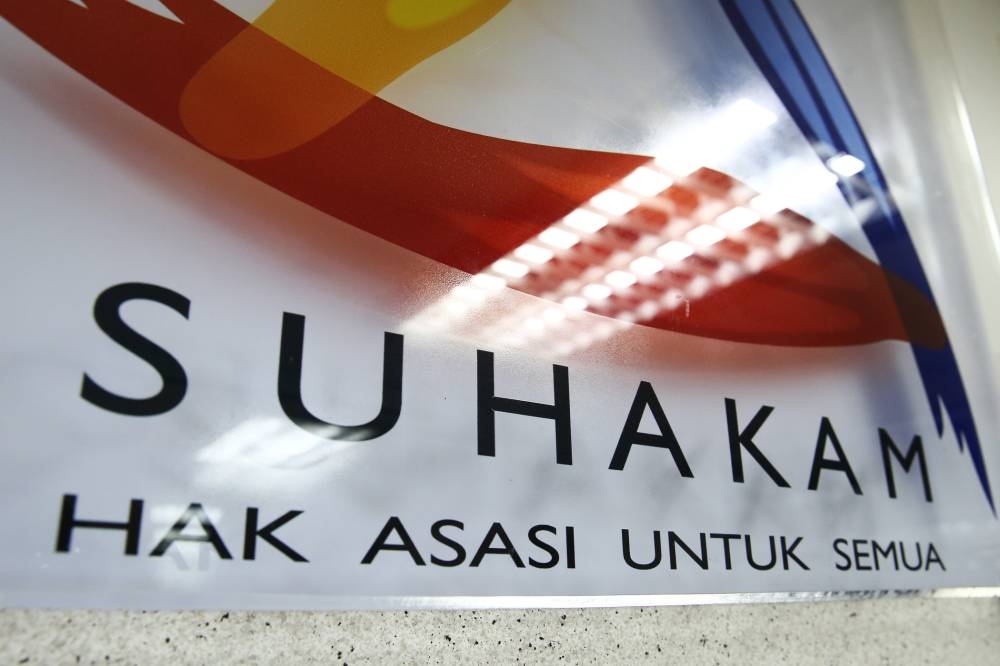AUGUST 11 ― Newly minted Suhakam commissioner Ragunath Kesavan said on Wednesday that there was no provision in the Human Rights Commission of Malaysia (Suhakam) Act 1999 (Act 597) that prohibited individuals with political ties from becoming a Suhakam commissioner.
The former Bar Council president was responding to questions by reporters on recent criticisms, including from several rights groups, who raised concerns about “controversial appointments” that could compromise Suhakam’s work.
Among others who questioned the appointments was rights group Suara Rakyat Malaysia (Suaram) who claimed that the appointment of Selayang Umno chief Datuk Hasnal Rezua Merican Habib Merican and Kulim Umno women’s division chief Nazira Abdul Rahman would severely compromise the neutrality of the human rights commission.
It’s true.

By section 5(3) of Act 597, a Suhakam commissioner “shall be appointed from amongst men and women of various religious, political and racial backgrounds who have knowledge of, or practical experience in, human rights matters.” (Emphasis added)
Ragunath should know better. But as men and women “who have knowledge of, or practical experience in, human rights matter”, he and his fellow commissioners should know that Suhakam is one of more than 110 National Human Rights Institutions (NHRIs) which are members of the Global Alliance of National Human Rights Institutions (GANHRI).
GANHRI brings together and supports national human rights institutions to promote and protect human rights. It represents more than their members and staff across all regions, GANHRI is one of the largest human rights networks worldwide.
GANHRI is recognised, and is a trusted partner, of the United Nations (UN). It has established strong relationships with the UN Human Rights Office and other UN agencies, as well as with other international and regional organisations, NGOs, civil society and academia.
As members of GANHRI, NHRIs like Suhakam are accredited by GANHRI. Accreditation takes place under the rules of procedure of GANHRI’s Sub-Committee on Accreditation (SCA).
The accreditation is guided by the principles of transparency, rigour and independence. There are currently two levels of accreditation: Status “A” and Status “B.”
Status “A” NHRIs are in full compliance with the Paris Principles – a set of international standards which frame and guide the work of NHRIs. Drafted at an international NHRIs workshop in Paris in 1991, they were adopted by the UN General Assembly in 1993.
Status “B” NHRIs are only in partial compliance with the Principles.
Suhakam has been accredited with “A” status since November 2009 after being recommended a “B” status in April 2008.
NHRIs are reviewed on a periodic basis every five years, with reviews focused on recommendations. Last year, the SCA convened virtually from June 14 to 24 where it considered applications for re-accreditation from 8 NHRIs, including Malaysia.
In its report, the SCA has recommended that Suhakam be re-accredited with A status. So well done Suhakam! The SCA duly commends the efforts of Suhakam to promote and protect human rights. The accreditation committee encourages Suhakam to continue these efforts.
The SCA, however, highlights that NHRIs that have been accredited A status, like Suhakam, should take reasonable steps to enhance their effectiveness and independence, in line with the Paris Principles and the notes and recommendations made by the SCA during the review.
The SCA notes that section 5 of Act 597 (members of Suhakam and term of office) still leaves open the potential for political interference.
The SCA is of the view that the process currently enshrined in Act 597 is not sufficiently broad and transparent. In particular, it does not:
― require the advertisement of vacancies;
― establish clear and uniform criteria upon which the Selection Committee assesses the merit of applicants; and
― promote broad consultation and/or participation in the application, screening, selection and appointment process.
According to the SCA, it is “critically important to ensure the formalization of a clear, transparent and participatory selection and appointment process for an NHRI’s decision-making body in relevant legislation, regulations or binding administrative guidelines, as appropriate. A process that promotes merit-based selection and ensures pluralism is necessary to ensure the independence of, and public confidence in, the senior leadership of an NHRI.”
As such, the SCA encourages Suhakam to advocate for the formalisation and application of a process which are in accordance with the Paris Principles that includes requirements to:
a) Publicise vacancies broadly;
b) Maximise the number of potential candidates from a wide range of societal groups and educational qualifications;
c) Promote broad consultation and / or participation in the application, screening, selection and appointment process;
d) Assess applicants on the basis of pre-determined, objective and publicly-available criteria; and
e) Select members to serve in their individual capacity rather than on behalf of the organisation they represent.
That said, the SCA duly also acknowledges the amendments prepared by Suhakam to its enabling law (Act 597) to address the above concerns and encourages the Commission to continue to advocate for the adoption of those amendments.
There are five other recommendations to Suhakam regarding full-time commissioners, adequate funding, cooperation with other human rights bodies, annual and special reports, and dismissal of commissioners. The report can be read here.
The new line-up of Suhakam commissioners has appealed to the public to allow them time to do their jobs. But time is what we want most, but what we use worst. (A quote attributed to William Penn, an English real estate entrepreneur, philosopher, and founder of the Province of Pennsylvania.)
Since the commissioners are not full-time members as the SCA report noted, two months is a long time gone that can never be gotten back.
There is a lot of catching up to do for the new commissioners to continue and follow up with the commendable work of their predecessors.
* This is the personal opinion of the writer or publication and does not necessarily represent the views of Malay Mail.





















